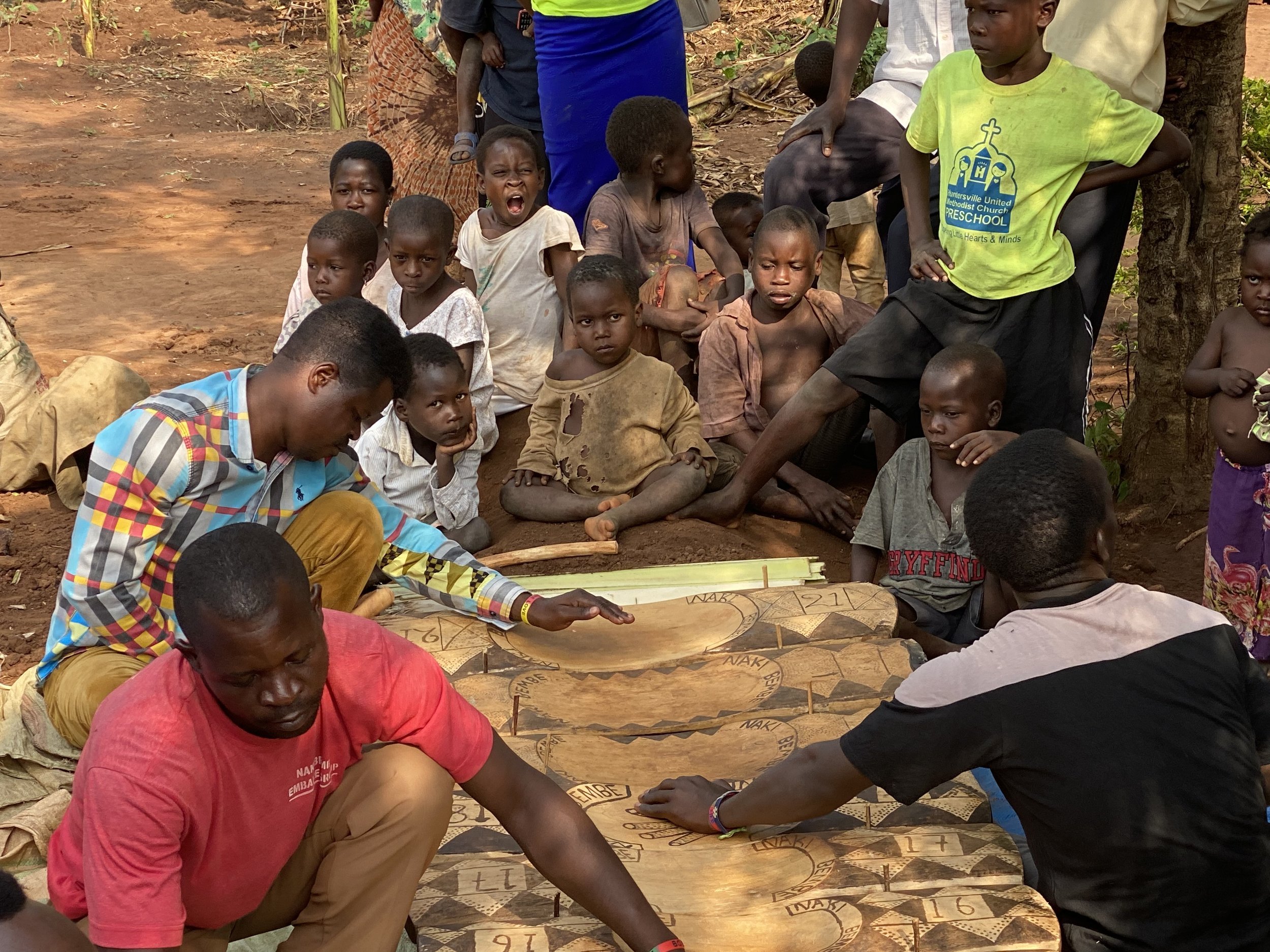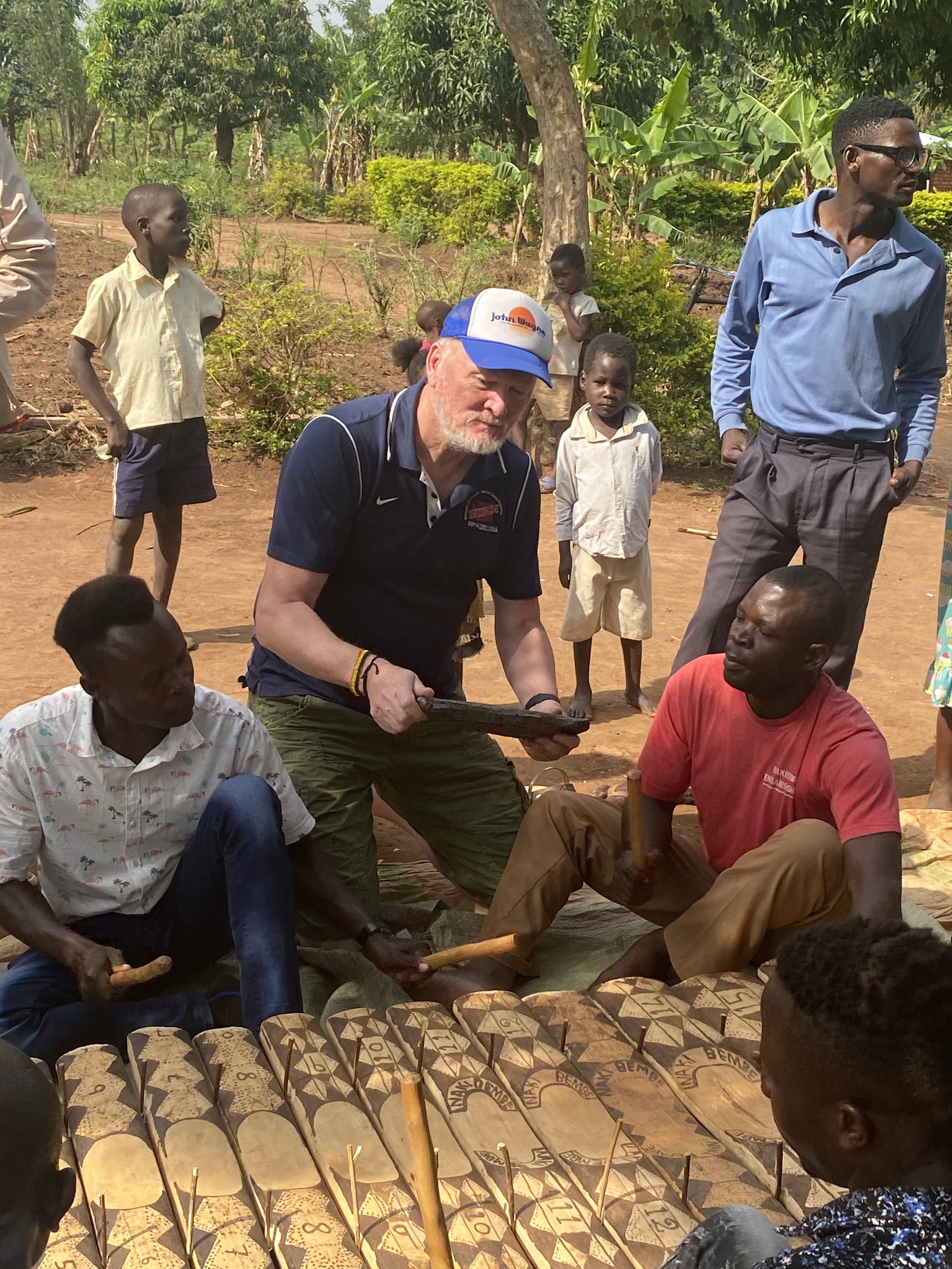MEET THE ARTIST: Nakibembe Xylophone Troupe in Uganda
The entire village is gathered around the village instrument, the embair, which is transported all the way to the village in July. Førde ! Photo: Bjørn Kristian Skovly
On Friday 7 July, the Nakibembe Xylophone Troupe from Uganda will play a concert at Førdefestivalen Read Bjørn Kristian Skovly from Veitastrond's fantastic travelogue from when he visited them in the village outside Kampala, February 21st of this year - and became a member of the band.
The strong red glow of a rising sun mingles with the fires along the main road out of Kampala. The fires roasting corn for hungry, busy travelers in the country that never sleeps. The women who constantly fan the leaves on twigs they have collected, fanning to keep the fire warm.
The traffic is heavy, both ways, and all the long-distance transport, as always, takes a toll on the speed. It's about being patient and letting your mind wander, but never forgetting to stay on the left side and to have all your papers ready for the police checks that always await when a muzongo - a white man - is out driving on his own. And quite rightly, it doesn't take many minutes before I'm waved in, it's implied that I've probably broken some law, and then we chat until they realize that it's not me they're going to get any bribes from this time either. The way no one gets from us, as a matter of principle.
The thoughts, yes, the excitement of what awaits me somewhere deep in the forest areas halfway to Kenya. If Hassan is standing there by the side of the road like the agent Lola claims he will, and not least if it is really drivable like Ugandans always think it is, if there is only one path left. Fortunately it is dry, it has been for a couple of days, then at least I will avoid the brown mud that tests my driving skills as if it were freshly broken ice on shiny summer tires.
The embair is played by 8 musicians.
Two hours from Kampala I pass Jinja, Uganda's proud tourist spot as the source of the Nile. True, both Rwanda and Burundi believe that the source is actually there, it is at least where the rivers furthest from Lake Victoria start, and without the water from those rivers the Nile would not have had a lake to flow out of, they believe. So be it, what's worse is that they have a proud statue of Speke who is said to have discovered the source of the Nile thousands upon thousands of years after the locals knew both the Nile and Lake Victoria. I feel a bit of the same irritation as when you have walked into Austerdalsbreen at home and see the metal plate that tells of when the glacier was "discovered" by Slingsby - the glacier that had been used for hundreds of years as a road locally.
The traffic opens up a little after Jinja, and Hassan, the little man who is the bass player in the Nakibembe Xylophone Group, is standing where he is supposed to be, a few kilometers before Iganga. The only one in the group who speaks a little English, with an emphasis on LITT, but in good dialogue in Luganda-English, we find the tone and cheer together towards Buanga where the others are waiting with their xylophones. A little fare, he says, Kinobe Hassan, who has played bass on the xylophone for 15 years. As it had to be for him and the other 20 in the group who grew up with music. Because it was his and some others' grandfathers who started it all, they were the ones who built the xylophone they still play on, the instrument with its 21 notes made different by the density and weight of each of the elements. The slightly simple, narrow brightest to the powerful, last bass piece that really makes the sound tremble when it is slammed.
How do they tune the instrument, making the many notes adjust so beautifully to each other?
Neither Hassan nor any of the others know – the materials were found and adapted back then, no one knows how many years ago, but it was in my grandfather's time. But then it turns out that it was probably a somewhat relative term, because when I try to find out the composition of the group, it turns out that those who were first siblings are probably cousins, or perhaps the children of my father's cousins. The attempt with second cousins is confirmed, obviously completely in the fog, with yes - many seconds.
Gradually we clear up the concepts, the group that started the xylophone adventure was his grandfather and the men of his grandmother's sisters. There were maybe five of them, maybe many more. But now it's become a little different, now some of them are from a different clan. It wasn't like that before.
Finally we can turn off the main road, onto the more exciting part towards the village. The road is a market right now! We slog along as they move stalls and a cow that has settled down in the middle of the chaos, before a bumpy sandy road opens up. Decent enough.
'A little far' was another hour east, and I wonder about those waiting, aren't they getting impatient? No, Hassan guarantees, they're waiting, they've been doing so since morning, and they can wait until the next morning if necessary. They're not in a hurry like that.
Tenya Hussein, Kapado Faisal, Amuli Hassan and Edaya Sharif. These are the four who are waiting and will be with us in Norway in addition to Kinobe, in addition there is one who is away this day. But there are many of the others who are probably there too, they are not used to home visits, this group.
However, they are often out at local events, such as weddings or introductions. Moreover, it has only been three days since they got to play for King William Wilberforce Kadumbula Nadiope Gaula IV. He celebrated that the court had determined that he was the rightful king after he was challenged. Unfortunately, we do not get to meet the king today, the missing flag on his palace tells us that he is gone.
“ When are they going to leave? I have no idea, Lola probably knows, she and Derek
who get them jobs. Do they know anything about Norway? Nothing, and
are basically not that interested either. They want to play and
"Entertain, and the rest will take care of itself. "
The road keeps shrinking in width, but the four-wheel drive is lurking ahead. Even my guide is a bit unsure when the road disappears into a river that crosses, but after a cyclist has driven across and shown where it is shallowest, that too is fine. Now we pass huge areas of sugar cane, and the old Tatras used for transport stand in a row and are filled up, while sweaty bodies with their pangas chop the canes to the right length. At a leisurely pace we get by, and soon there is only a path with grass on both sides that is our road. Only a little fare now, our friend insists, at the same time as we open the windows because we will be able to hear them from afar. And so we do, at first just the heavy bass beats, but eventually both the music and the very special song.
The favorite, Hassan tells me, is the nseranta, the song about a man who loves a girl but can’t have her until he can pay a cow as bride price. He never manages to do so, and he lives unhappily until his death. The nseranta follows us along, where the group sits under a mogassia tree that provides good shade while they play their arousing rhythms. It’s a very special atmosphere, as deep into the forest as you can get – only the rhythms from the blows performed by sweaty bodies hitting the notes with surgical precision with rhythm boxes add an extra sound, along with the one on the special string instrument, the adungu, adding a nice little note right at the top.
I am welcomed when the nseratan is over, and meet a group as far from our worries and plans as possible. When are they leaving? I have no idea, Lola probably knows, she and Derek who get them jobs. Do they know anything about Norway? Nothing, and basically they are not that interested either. They want to play and have fun, and the rest will take care of itself.
Then it's on again – and the village slowly but surely gathers around the tree. Another break, and I try again. What kind of tree gives this nice sound? A discussion with as much enthusiasm as if it were the question of life goes on for a long time, before Hassan answers with one word. Musambya – which I find out at home is called Markhamia in English. A tree with yellow flowers that can grow up to 40 meters high, and whose bark can be used for skin problems, I read up on. But the xylophone group really gives it a whirl.
“ A small farewell speech, included, received with stoic calm until the redeeming mpologoma la Uganda – you are the lions of Uganda!
They liked it, and I'm looking forward to being with the Ugandan lions at the festival in Førde ! ”
The instrument they play and are going to Norway was built by their grandfathers, so they don't have to mess with it. A quick demonstration shows how they can divide it into three equally sized packages for transport, and then we get to the most important thing – namely the ensasi – the metal tubes with something or other inside, no one knew what, that is involved and keeps the rhythm. No one is taking the ensasi to Norway, but I am there.
Down on my knees, ensasi handed over, and Hassan whispers a few words in my ear – we'll start slowly and increase, hang in there...
So it ends up there under the tree, to the great joy of the village, that the strange white man sits and shakes the ensasi at an ever faster pace until the sweat drips – but receives nodding recognition from the expert jury. Such is the changing life of a roadside stand, from the cafe with the old people on Strondi to a rhythm box under a mogassia tree deep inside Buanga.
50,000 shillings that provide drinks for everyone is well received, and we agree that it will be nice to meet again. A short farewell speech, included, received with stoic calm until the redeeming mpologoma la Uganda – you are the lions of Uganda! They liked it, and I look forward to being with the lions of Uganda at the festival in Førde !
Then the trip home to Kampala - nothing special, but there were certainly a few more traffic stops - and the same procedure as always. No, I hadn't done anything illegal - and then they eventually found out that I probably hadn't.
Safely in place now, family visits and conference classes at the school in Buikwe tomorrow – and then I agreed that it had actually been a very nice day!!
Bjorn K.






